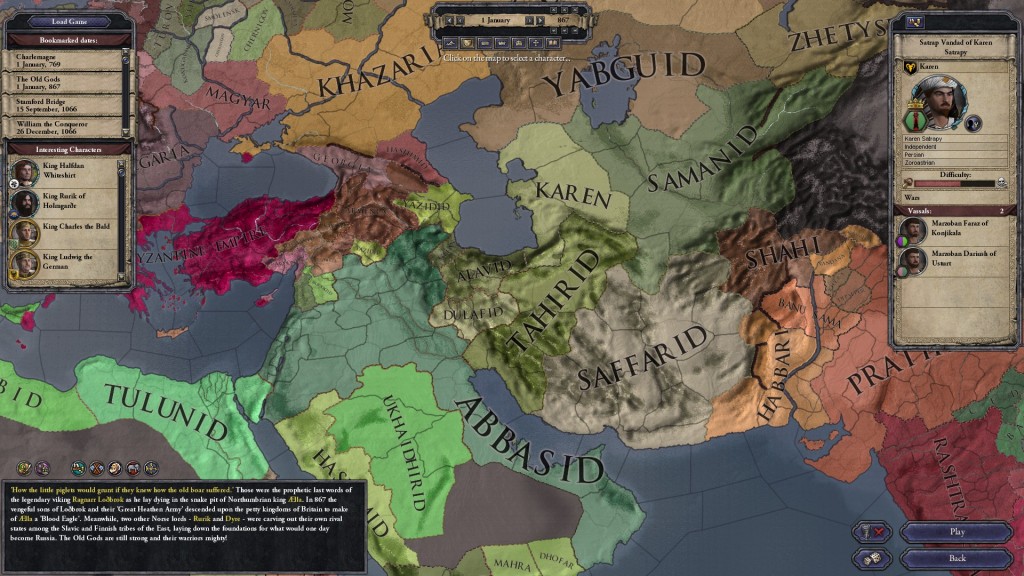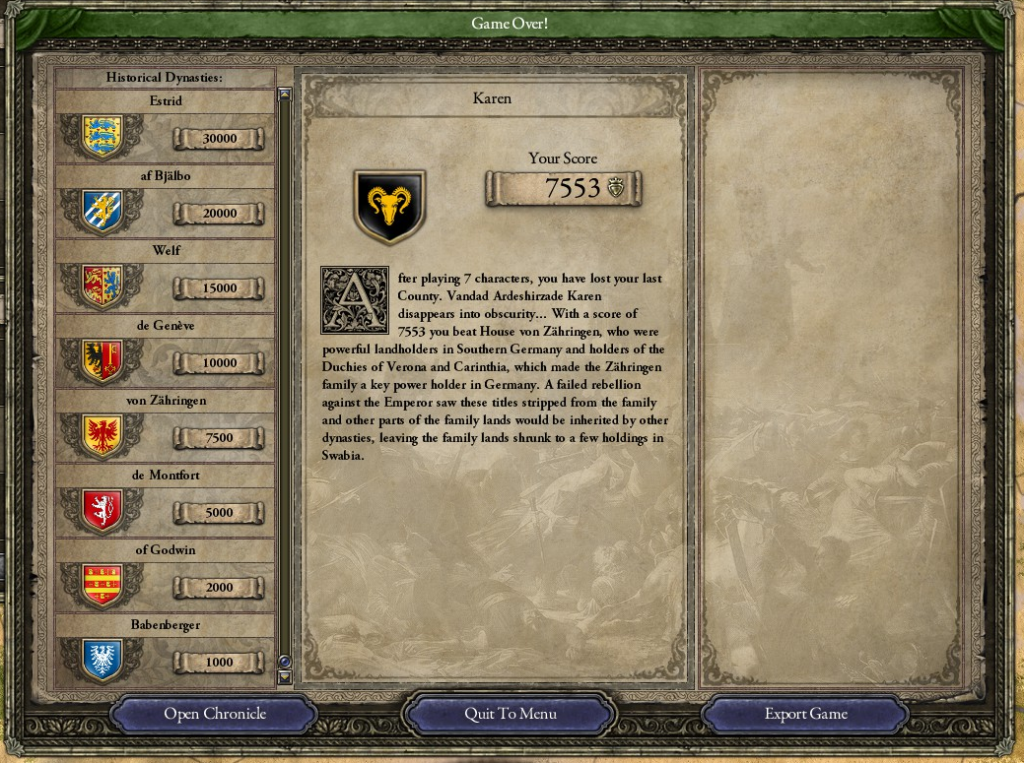- Crusader Kings II: Snowballing on the Steppes
- The Lantern Bearer: revisiting Crusader Kings II
- The OTHER space grand strategy game: Crisis of the Confederation
- Crisis of the Confederation Q&A, with Gregory Hayes
- Remembering the greatness of Crusader Kings II
I thought I’d cracked it.
Over and over again, I attempted one of the greatest challenges in Crusader Kings II – play a Zoroastrian and restore the Persian Empire. Over and over again, I fell prey to larger, stronger neighbours. Proud independence seemed impossible.
Now, it was time for one more approach. I pledged fealty to a weak king — and set myself up as the power behind the throne. It worked: I kept my dynasty, the House of Karen, alive for a hundred years. And one day, I overreached. Playthrough after playthrough had been cut short by the vast armies of the Abbasid Caliphate. Why not switch my allegiance to the Caliph, undermine his rule from within, and pick up the pieces after his fall?
Seventy years later, after my umpteenth rebellion, the Caliph stripped my dynasty of its last lands. I had forestalled fate, not changed it.
That was the furthest I ever made it in the Zoroastrian/Persian challenge. Sometimes, I’d survive fifty or a hundred years, only to succumb to invaders. On one subsequent run, I did very well for fifty years, only to fall foul of inheritance laws. More often than not, my efforts resembled medieval Groundhog Day: start, collapse in the first few years, start again.
And yet, this was the most fun I’ve had with CK2. I liked the new mechanics introduced since I’d last seriously played, such as tribes, raids, and factions. I liked the constant excitement that came from being in a dangerous neighbourhood — when I’d played relatively secure rulers, such as William the Conqueror or Matilda of Tuscany, there hadn’t always been enough to do. I liked the challenge itself: at one point, I gave up, tried the Norse, had a great time… and eventually went back to Persia, because the Norse were just too easy. Even continued failure didn’t discourage me: if I could just grab that province a little faster, if the Caliph would suffer a rebellion at just the right moment, if, if, if!
Most of all, I liked the stories.
I’ve previously remarked that most strategy games are rags-to-riches stories. And had I succeeded, this would have been one of the best: the underdogs who restored an ancient empire. When I eked out victories, I rejoiced. When I made concessions (renouncing independence, abandoning territory, converting to stave off a would-be conqueror), the story morphed into one about patience and cunning. I thought of a folk tale I read as a child, about a defeated king who forced himself to lick bitter gall every day and sleep on sticks every night. That king had the last laugh. So, I thought, would I. I even imagined how I’d chronicle my eventual success on this site.
That success never came. It seemed that at best, I could play out a story about valiant underdogs struggling to keep their faith, their traditions, and their empire’s memory alive. As the setbacks and restarts piled up, my thoughts turned to the novels of Rosemary Sutcliff, in which King Arthur and the last Romans struggle to defend Britain against Saxon invaders. Reading Sutcliff, we know that her characters cannot win, and despite all my efforts, neither did mine. Instead of the triumph I’d envisioned, my story ended up a tale of doomed resistance.
All the same, I don’t think my characters’ efforts were in vain. Consider this passage from Sutcliff’s The Lantern Bearers:
“I sometimes think that we stand at sunset,” Eugenus said after a pause. “It may be that the night will close over us in the end, but I believe that morning will come again. Morning always grows again out of the darkness, though maybe not for the people who saw the sun go down. We are the Lantern Bearers, my friend; for us to keep something burning, to carry what light we can forward into the darkness and the wind.”
Through courage and cunning, my characters carried their light forward, 150 years after it should have gone out. That’s a story worth celebrating. And I like to think future generations kept a little bit of their legend alive.

Appendix
Fancy trying to become the Saoshyant? Here are the characters — and the approaches — I tried (as of the Charlemagne patch). Good luck!
- Rostam Bavandid, 769 — As vassals of the Abbasid Caliph, the Bavandids’ only hope is for the Caliphate to break up before their titles are revoked. Immediately start a faction for independence, and hope that you can sign up enough of the Caliph’s vassals to win the subsequent revolt. I only pulled this off once… and even then, I lacked the strength to capitalise on the resulting chaos.
- Wakhushakk the Sogdian, Chach, 769 — Spend the first few years building up prestige until you amass enough (500 points) to raise a tribal army. Once you can raise an army, start gobbling up the nearby tribes, and raid your sedentary neighbours for cash. Just watch out — you’ll become vulnerable every time a less prestigious ruler succeeds to the throne. That’s when the computer loves to pounce.
- Vandad Karen, Dihistan, 867 — The Karens face two main threats: the Saffarids to the southeast, and the Abbasids to the southwest. Fighting either head-on is suicide. Instead, take advantage of a short-lived opportunity that exists at the start of the game. Quickly march east and launch a Holy War against the Samanids, while the Saffarids are distracted with their own wars and the Abbasids are still some distance off. Then turn around and pledge allegiance to the newly-beaten Samanids, to keep yourself safe from Holy Wars. I could probably have survived decades or even centuries longer as a Samanid vassal, if I hadn’t grown impatient and switched my allegiance to the Abbasids instead.
Crusader Kings 2 base game and some DLC supplied by Paradox. I purchased the more recent DLC, including The Old Gods and Charlemagne, which made various Zoroastrian characters playable.

Wow, that’s was incredible! I wish i have CK2…
Thanks, glad you liked it! It frequently goes on sale, so hopefully you’ll spot a chance soon.
I wanted to come back to reading this because honestly, being a tribal ruler in Ireland is fairly boring. Relatively speaking of course, because I know there is so much more I can be doing, and CK II is a game that has its fair share of secrets lurking around the corner. Just today was tense times as my only son, and single claimaint to all the hard work I’d done in the formation of Ireland, died from stress. I could have died myself. He was groomed to take the mantle, switch to merchant republic and make Ireland a trading powerhouse like the world had never seen. Instead, it was up to a 60 year old character, depressed and widowed, to find a bride, wed her (prestige be damned) and keep the blood line going. Sure enough, he did me proud. I cursed at the computer when I first get a daughter, then was followed up with three sons over the years. The old man lived a long life, that I can be thankful for. All in ironman because there are no reloads in life.
I think I’ll see how I go with the reformation of Persia. I suspect the same problems you had will be mine too.
Congrats on your lucky escape! Something similar happened to me in one of my Persian tribal games – tons of daughters and only 2 sons. 1 son was murdered, and the other died before he could sire kids. And I’d been doing so well, too. :/
Hm, I’ve never tried Ireland. Is the problem that there’s not enough to do? Looking at the map, the Irish tribal holdings don’t generate enough gold to make it worth raiding each other, and without ships, there’s no way off the island.
I’d love to hear how you go with the Persian run! I suspect you’d have the best odds as either Wakhushakk in 769 (blob as a tribal and then pounce on your feudal neighbours) or Vandad in 867 (just don’t try to pick a fight with your neighbours until they’re weakened by decadence). I’ve seen a few people talk about Gilan in 867; haven’t tried that start yet.
Yes, with Ireland, you need ships and to do that, you need shipbuilding tech. In order to reach that, I had to send my Spymaster to Constantinople to study tech there for a bit and get lucky. Plenty of spy masters disappeared. Income-wise, I actually forget how I got the shipyard built, might have been based on time, and keeping good relations with my Bishop. I initially thought I needed to raid foreign religions, which is how I spent a long time raiding the Spanish coast and taking gold from the Islamic population. Who knew the Irish were such adept invaders ;-) But there is a sense of fulfilment in building a united Ireland, having a key role in developing it, and my thoughts are turning it into a merchant republic.
After all my conquering, Gavelkind was not so kind meaning a younger brother actually has a higher powerbase than what my playable character has, should he go independant. That’s the joys of Tribalism I suppose. Of course, my character suffers from Leprosy, so he won’t be getting married, and the sooner he dies and my lands go to my brother, the better. I know I’m gaming the system a little bit here, but please, there is no way I can go through life as a leper. I;ve also gone ahead and started spending more time completely raiding the french coastline, actually sacking cities for the gold. Might as well do it with the sizable army and fleet I can muster. Next job is to sort out alliances seeing as the rest of Ireland is locked up with a singular tribal lord with his own significant allies.
This really is an amazing game that makes emergent story telling so easy. Who’d have guessed I just wrote two paragraphs and could chronicle a story as part of an alternate timeline for the course of history. Bear in mind too that I want to transfer this game to EU IV later. It’ll be interesting to see how it handles Ireland as a merchant republic, or if it can.
Sounds like a plan! Yeah, I think emergent storytelling/alt history generation has always been Paradox’s strength, through the ups and downs of their games.
My understanding is that Paradox has recently fixed the converter (it had been broken by some of the earlier expansions), so I’d think you’d be OK with Ireland. I wanted to transfer my Persian game to EU4, so I held off Art of War so I could finish the CK2 campaign. Of course, I never made it that far. :(